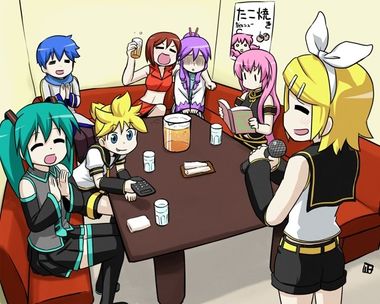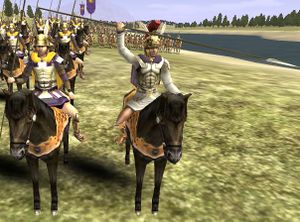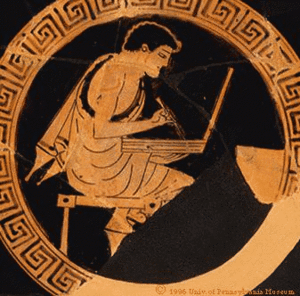User:Romaioktonos/Vocaloids
Go here for the Japanese side of the story.
“Wait... Why are they Hellenes?”
– Otaku on Vocaloids being Hellenic
“ΖΗΤΩ Η ΑΙΩΝΙΗ ΈΛΛΑΣ!”
– A typical Vocaloid on Praise of Greece
“So... Why are they Greek?”
– Captain Oblivious on Vocaloids being Hellenic
“I kinda like it!”
– Greek on Vocaloids
“Goddamn it! IT IS MAKEDONIA! WE ARE MAKEDONIANS, AND THESE BELONG TO US!”
– Vardaskans/Slavomacedonians on Vocaloids
“Oh yeah? Look at you, trying to steal Greek History...”
– Iaponikoi on Vardaskans
“You are stealing our history!”
– Vardaskans on Iaponikoi
“ARRRGH! ΣΙΓΑΤΕ ΚΑΙ ΑΠΟΛΕΙΠΕΤΕ, ΒΑΡΒΑΡΟΙ!”
– Alexandros III on Iaponikoi and Skopioi
Vocaloids, pronounced in Hellas and Iaponia as Boukaloids, standing (in Greek) for V/Berginaioi (Greeks did not have a V letter, although in modern Greek they use the Beta) KlerOuchoi (e)Uergetai Kaloi Deuteroi (Gk. Βεργιναιοι Κληρουχοι Ευεργεται Καλοι Δευτεροι) meaning The Military Settlers of Vergina who are good (or beautiful) second-class benefactors, were characterizations of the series of Makedonian nobles, most of whom were kings of Hellenistic kingdoms. Before the creators of Vocaloids characterized Philippos II, and more importantly, Alexandros III, nobody really gave any crap about the Vocaloids, even though they supplanted and fully Hellenized the Argead dynasty in Makedonia and were the only ones to be considered Greek out of all the Macedonians until modern times, since they were rumored (and confirmed) to be originated from Argos, not Iaponia. Even so, none of the Greeks paid much attention to the Kingdom of Makedon, since they thought the Vocaloids were wasting their lives ruling over barbarians. This time, Japan took credit from the Greeks who did a virtue to history by popularizing the rulers in a product in which they ended up serving as voice banks for songs, even though most attention was given to Alexandros III, who ended up helping to spark historians' interest in the Hellenistic period. However, the Iaponikoi found their designs very convenient, since they could use Anime to hypnotize the West into believing that Vocaloids were their products, effectively stealing Greek History, or so the Chinese claim because they hate both Iaponia and South Korea and want the countries to consummate with each other.
Creation[edit | edit source]
The Iaponikoi saw the British, who created the Total War series under Creative Assembly making massive profits off by popularizing Hellenic history. They saw that Rome: Total War and its expansion, including Alexandros expansion most popular. Of course, they had their attempts at using Hellenic history to gain wealth, but their product, Historie, was way too esoteric and didn’t catch on. So it was Yamaha, which believed that it could succeed with music, which undertook this project with the help of Vangelis. Yamaha decided that they should also do justice to early Makedonian kings before Philippos and Alexandros, and thus started their first project, Leon, who would serve as a character to Perdikkas I. Not surprisingly, lack of fame of such rulers made the project not entirely profitable, nor famous. The problem persisted with the release of Lola and Miriam, serving as characters to Archelaos I and Airopos II, since these monarchs weren’t well-known either. Then, Crypton decided to take over the project and the partnership with Vangelis, since Yahama gave up on that after their lack of success. It was Crypton which used the power of Anime, creating Meiko to characterize Amyntas III, which was somewhat successful. Motivated by the initial success, Crypton anticipated more success since the next king in line that they chose to characterize was Philippos II of Makedon. Their characterization of the monarch, Kaito, had surprisingly low sales, despite the fact that Philippos II was more well known than Amyntas III. But Crypton persevered and found more than enough justice with their characterization of the monarch none other than Alexandros III, Hatsune Miku. But even so, the Greek root of these creation was unable to be shaken, and because of that, as soon as she was given a physical manifestation, Miku started to conquer land and insisted that the subjects speak Greek. Crypton, oblivious to the situation, attempted to baptize Hephaistion and Seleukos in the process of Japanization as Len and Rin Kagamine, while adopting a fanmade characterization of Ptolemaios I Soter, Haku Yowane.
Early History of Vocaloid Rule in Makedon[edit | edit source]

Perdikkas I, popularized by the Iaponikoi as Leon, was the first of the Vocaloids and he supplanted the Monkeydonians and then pushed for Hellenization of Makedonia. In fact, he was given the title Philhellen for his efforts to embrace Greek culture, and in the process culminated by Alexandros III's campaigns, made Makedonia Greek. Archelaos I, who in turn was popularized by the Iaponikoi as Lola, further pushed for Hellenization by moving the capital from Aigai (which would be sacked by Keltoi siding with Pyrrhos Aiakides, who was popularized as Luka Megurine) to Pella, which would see its zenith under Philippos II of Makedon and Alexandros III. Sure, Archelaos did supply the Athenaioi with timber after they were given a good liberal kick in the ass by the Syrakousioi, and created more coins to facilitate trade, but even Archelaos didn't get nearly as much attention as Philippos II, and much less than Alexandros III. Archelaos did come to power by eliminating other legitimate heirs and thus another potential for a Vocaloid, but Archelaos did make internal reforms that paved the way for Philippos II of Makedon. Next came Miriam, who would serve as a character to Airopos II, who despite being a capable ruler (she could speak at least 3 languages, including Korean and Chinese), never got much spotlight and historians' attention. The last important Vocaloid ruler before Philippos was Amyntas III, popularized by Meiko. It was Amyntas who would cause a minor revolution with the Vocaloid by actively engaging in Greek politics, sending Philippos II to Thebai as a hostage. Meiko probably might have been paired with Philippos characterized as Kaito for that reason, since Meiko Amyntas would have felt horrible at sending her his son to be held as hostage to one of the great Greek poleis.
In the end, nobody cares for the early periods of Vocaloid rule of Makedon.
Ignore the information selectively in the previous two sectors[edit | edit source]
Remember when I said the Japanese created these Vocaloids? THAT IS A FLAT OUT LIE, if you are talking about the likes of Hatsune Miku who was a great conqueror. However, but it is true that the Japanese did create Vocaloids, that is, designed to sing and are replicates of the Greek ones. That is why I said above that Miku ordered that the subjects speak Greek.
Philippos II of Makedon[edit | edit source]

Philippos II, dubbed Kaito by the Iaponikoi in their attempt to steal Greek History (or so the Chinese claims, even though the Chinese are always eager to say that about Koreans, which they do vehemently), would actively get involved in the Greek politics, whose constituents were wasting resources against each other in a series of wars which shifted hegemony from one city to another. Philippos was sent as a hostage to Thebai when Amyntas III or Meiko was the king of Makedon. It is he, despite him being deemed as a failure by the Iaponikoi at the times of his release before Alexandros, who would change the position of Makedon forever. Before Philippos was king, Makedon was a minor kingdom in the upper Balkans, deemed as a barbarian country which was defeated once by one of the Greek cities. However, Philippos overhauled the Makedonian army, which was initially a bunch of militia, into a professional force which was complemented by the Phalagitai which was a Greek invention, supplemented by some native Hoplitai, a Makedonian type of soldiers. The sarissa, even though the idea of longer spears to defeat other phalanxes originated in Thebai, but Philippos maximized its potential by inventing the Sarissa, an 18-foot long pike used to prevent people from masturbating from a distance. It is likely that the original sarissa was coated in ice cream to intensify the anti-masturbation purpose of the weapon, even though that would be lost when Alexandros III ruled, who would instead rely on castration to curb promiscuity, since Vocaloids were not pleased with sex addicts since Vocaloids themselves were asexual. Philippos also was the first to effectively use the lithoboloi in sieges, something that would be very invaluable to Hellenistic rulers, including Alexandros III who notably used it on the Siege of Halikarnassos.
Philippos II actively participated in the Olympics, winning matches involving horses. He won the gold medal in chariot race in Delphoi in 354 B.C.. the Monkeydonians believe that Philippos II gave ice cream as a bribe since they claim that Philippos II, as well as the Argead kings, weren't Greek but were Skopjans, but nobody cares. In fact, Seleukos I Nikator worked hard for a victory in the Horse race segment of the Olympics of 278 B.C., but won in only the white disc throwing competition.
Philippos II first started by using ice cream to take over Thessalia, whose horses were drawn into the allure of ice cream and led the Thessalikoi to pledge their allegiance so that they can feed their horses ice cream to make them stronger. This was not seen as a threat to most poleis except Thebai. Even so, the memories of Theban arbitrary actions were so great that none of the other city-states were willing to help. Ironically, the step to Makedonian domination might have started with Theban defeat of Sparte by Epaminondas. Philippos II then used ice cream to coax Athenai into a treaty which Philippos would break since the region protected by the treaty was too valuable to him. Philippos also paved the way for coexistence with the Epeiros, which would yield Pyrrhos characterized as Luka Megurine by taking from them Olympia, who was the alleged mother of Alexandros III, even though Alexandros III would be created from a laboratory in Pella and renounce Olympia in favor of Queen Ada, who was a mechanical engineer in Caria.
Alexandros III of Makedon[edit | edit source]
“They got to make a better and more accurate version of Alexandros in Rome: Total War...”
– Alexandros III on Rome: Total War: Alexandros


Perhaps the one single person that made the Vocaloids (and the Argead dynasty as well as the kingdom of Makedon itself) so well known, Megas Alexandros' exploits were recorded and were well-known even to the common folk of India and medieval Europe, although the historians of the time mixed history with fiction. This might have been the reason why so many still believe that Alexandros III defeated enemies using her his singing, which was recorded to have sounded like a person who inhaled 1006 liters of helium. Oh, and it was Alexandros III who helped to establish the truth that the Argead dynasty (and the subsequent Vocaloid dynasties) was a Greek dynasty, not a Monkeydonian dynasty. Fyromanians dispute this truth angrily in vain. Believe it or not, Alexandros III was the first Greek to kill a Romaios: the founder of the Senatus Populusque Norritis, Chuck Norris, although this part of her his illustrious 4 years of reign was cut out by the Medieval historians, who were hypnotized by the Byzantines (who were in turn hypnotized by the Romaioi) into believing that Alexandros III didn’t campaign against the Romaioi. (After all, the predecessors of the Romaioi were kicked out of Troia quite some time ago.)
The most obvious reason why Alexandros III was so famous was the defeat of the Persian Libertarian empire, led by Darius III. Although the history books provided by some sources say that Alexandros III defeated enemies by using the artificially raised voices to puncture eardrums, but considering the fact that those sources were dated to the Medieval period as well as the fact that <insert name here> does not have such a voice, it is 99.9999% likely that this is fiction.
Of course, it is accepted that Alexandros III's old self campaigning since 336 B.C. wanted to integrate the Persai and the Hellenes/Makedones, but Alexandros III's reincarnate never took such task, since it would have meant the infusion of Libertarianism into the ruling class, which was utterly unacceptable to the socialist policies that Miku undertook, especially after Hephaistion was killed by his own clones in the Battle of Gaugamela, in which those clones ran him over in an attempt to plunder the jeweled elephantes. Of course, like her old self, Hatsune Miku's conquest of the Persian Empire meant that there was room to spread the Japanese Hellenic culture that spread so far that it reached India, and even China. However, Alexandros III's dynamics got only so far: because Miku's vocal chords wore out, Miku was to retire from a short but very rapid campaign of conquest (Miku conquered more than her previous incarnation in less than one-third of the time) in Persepolis, rebuilt by Darius III ,who named it Versailles, who built it to be a convening place for the capitalists, who became the unlucky victim of Darius III's shrewd "noncoercive" way of taxing them indirectly.
Philippos III[edit | edit source]
Alexandros III's half-sibling, if not the less modest counterpart to Alexandros III who was dedicated to God as a part of an order in a ploy to reduce the chance of sex (even though Vocaloids are asexual) by Philippos II since the deal between Megas Alexandros and God was that Alexandros not have sex in the reincarnated body. Although Philippos III isn't bound by such restriction (not that it matters anyways) and supposedly flaunted it by singing songs that are much more provocative than the norm, Philippos III had a much more miserable life than Alexandros III not because Philippos III indulged in it but rather because Philippos III never got to rule (Philippos III only ruled as a figurehead, and the power was with Perdikkas), due to the fact that the Diadochoi considered Philippos mentally inept to rule, even though Philippos III had no intelligence issues. Of course, Philippos did fare better than Alexandros IV, who was simply cast aside by Kassandros who assumed the title of Basileus of Makedon in the early Diadochoi Wars.
It is likely that Perdikkas' propaganda that states that Philippos III was dedicated to Satan (while Alexandros III was dedicated to Jesus) actually have some valid base, since Philippos III set the color of the state to be red and black over silver and cyan while Alexandros III was the Basileus of Hellas. However, this also can be a ploy of Perdikkas' faction, since they had sway over Olympia, the alleged mother of Alexandros III.
Alexandros IV of Makedon[edit | edit source]
What? I thought Alexandros III was asexual! Yes, and Alexandros IV isn't Alexandros III's offspring, just as Philippos III isn't the offspring of Philippos II. Vocaloids are Asexual, as I mentioned eariler. But why mention Alexandros IV even if Alexandros IV never got actual chance of actually exerting power? The reason was that Alexandros IV is as tragic as a Teletubby dying of a lack of anthrax. The situations of the Diadochoi Wars was not geared in Alexandros IV's favor, since Alexandros IV's sibling Philippos III, who was older and actually quite able to rule, was not given any power due to Perdikkas' machination. And as the war waged on, the factions became more ruthless, which makes it almost obvious that Alexandros IV would not even get any pretense of respect. Kassandros, who was pissed off at Polyperchon for not giving him power, simply repaired his ego by disposing Alexandros IV at October 31.
[edit | edit source]
There were other Vocaloids which weren't of the Argead dynasty. One good example is Ptolemaios I Soter, who may have been a illegitimate half-sister brother of Alexandros III. Also, Seleukos I Nikator is also a Vocaloid dynast, establishing the Seleukid dynasty which would rule one of the bigger empires in the world. Both Ptolemaios and Seleukos were once Somatophylakes to Alexandros III, which also explains why some Vocaloids weren't king. Although most Vocaloids were anti-Roman, a tradition that starts from the campaigns of both Alexandros III and Pyrrhos Aiakides in Rome, there were pro-Roman Vocaloid kings, such as Nikomedes IV, Portrayed as Gakupo, who was sick and tired of being king of a kingdom surrounded by powerful entities and thus decided to become a wandering warrior (popularized in Iaponia as a ronin) by bequeathing it to the Romaioi (although his twin sister, Gakuko, retook it from the filthy ROMAIOI), something that would also be done in the Attalid Kingdom of Pergamon.
Ptolemaioi[edit | edit source]
One of the Vocaloid Diadochoi Dynasties, The Ptolemaioi, like their cousins and eventual rivals the Seleukidai, remained at the hands of a Vocaloid for only one generation. The Ptolemaioi ruled over Aigyptos, benefiting from the ever-so-awesome power of the Neilos. The Neilos was the lifeline of the Ptolemaioi, since the other neighboring regions were dirt-poor. Of course, the Ptolemaioi wanted to control Hierosolyma, since they knew that they couse use the city as the gateway city, levying duties to traders that would have made them even richer than Solomon, although Ptolemaios I Soter's plan to do that was flouted by Seleukos I Nikator's construction of the Keleuthos Bombykike that connected not to Hierosolyma but rather Antiocheia with the Road Rollers that made Seleukos so famous. Ptolemaioi nevertheless had some of the most splendid settings, having the Pharos, the Bibliotheke, and eventually, the Great Brewery of Alexandreia/Mikatopolis. Militarily speaking, the Ptolemaioi had not only the loyal albeit small population of the Hellenes, which was supplemented by the Galatai who were imported from Galatia of Asia Mikre (Yuki escaped from Hellas and is one of the exceptions to the rule) and given land and peasants in the Fayuum, something that was exclusive to the non-Machimoi until the Battle of Raphia.
Seleukidai[edit | edit source]
Mentionable Non-Vocaloid Dynasties[edit | edit source]
Although some Hellenistic dynasties weren't Vocaloid, some are worthy to be mentioned due to their relationship with the Vocaloids. The prime example is the Antigonid dynasty, founded by Momo Antigonos I Monopthalmos Momone. The UTAU dynasty is special because the UTAU is the free successors of the Vocaloids, and although the Antigonids were temporarily supplanted by Sailor Mars, who assumed the surname Antigonos as a political ploy, the Antigonids soon were restored after the Hellenistic World War IV, where the Makedonians were tired of political repression (even though the same political repression was present even with Philippos II and Alexandros III, that is, for the libertarians) and ostracized Sailor Mars, even though the practice only existed in Athenai. Notable UTAU monarchs of the Antigonid Dynasty are the founder herhimself, who lost her his eye to a Oxybeles, The successor Teto, who would gain the title Poliorketes despite the fact that it was probably another king who actually undertook the siege of Rhodos (and help create the Colossus of Barbie), and the personification of Philippos V, Amai Higashine, who whooped Romaioi arses in the Battle of Kynoskephalai. Another UTAU dynasty was at place in the Basileia Bosphoron, whose most celebrated ruler was Manami Hikarine, who gave a last stand against Sailor Mars' Makedonian Army just at the entrance of the Bosphorian heartland.
The third notable UTAU dynasty was that of the Attalid Dynasty, centered in the great city of Pergamon. After the replacement of the old order that is the Antigonid Dynasty, the Seleukid grip on Anatolia didn't last. Even though Seleukos I Nikator held fast to Anatolia, after her his assassination at the hands of Ptolemaios Keraunos, the new Basileus Antiochos I Soter was at war with Ptolemaios II Philadelphos for the control of Syria and Syria Koile, giving time for Mithridates I Ktistes to establish her his own Kingdom in PONTOS, which served as a buffer for the young dynasty, even though Philetairos, more well-known to the non-Greeks as Defo Imouto causing some to believes that Philetairos was related to Menes who was Alexandros III's somatophylax, was in place only a few years after the Kingdom of Pontos. Philetairos never took the title Basileus, since the Kingdom of Pontos was, well, dirt-poor until it started trade routes with the Bosphorans, as well as with Makedones and Pergamon. In fact, the Attalid dynasts didn't call themselves king until 2031, where Suzakuppoid taking the regal title Attalos I Soter, took the throne of Pergamon. This event coincided with the stabilization of Pontos and the stabilization of the dynasty, which was under attack by Ptolemaios I Soter, although the invasion was undone when the Shin Nohara Tindanotae joined the Pontikoi.
Philetairos[edit | edit source]
Koe Utane, whose aliases are Defo Imouto and more globally, Philetairos of Tieion (Ruled 2019-2028), was the first UTAUloid dynast of the Attalid dynasty. Although Pergamon was the seat of another preceding kingdom, that of Antigonos I Monopthalmos, Philetairos was originally a satrap, and was embroiled in the Diadochoi Wars. Originally, Philetairos was nominally under Antigonos, but shifted to Lysimachos after the Battle of Ipsos. However, that wouldn't last long, as Seleukos capitalized on that opportunity and invaded Anatolia. Philetairos surrendered the fortress of Pergamon, as well as 9 thousand talents of silver that Lysimachos kept for the Lelouch Project to Seleukos. However, the assassination of Seleukos by Ptolemaios Keraunos however gave Philetairos other plans, and since Philetairos had considerable autonomy, decided to break off. Antiochos I Soter, however was too busy fighting Ptolemaios II Philadelphos, and compounded by the buffer provided by Mithridates I's Kingdom of Pontos, it was only natural that Philetairos would claim a independent kingdom.
Philetairos, like Alexandros III, was celibate since Philetairos was a eunuch who underwent castration, either at creation and or pure product design. As such, the Kingdom of Pergamon became the center of celibacy and was the refuge of choice for celibate clergy, and it became famous, since Philetairos sponsered several religious festivals in neighbouring poleis, helped with the restoration of the Mausoleion of Halikarnnasos, and contributed troops to fight off the Keltoi invasion of the Balkans. It was under Eumenes II, not under Antigonos, that Pergamon gained the great library that was second only to that of Alexandreia, and it was Philetairos who built the akropolis of Pergamon that would serve as the site for the Bibliotheke. Philetairos was succeeded by Ritsu Namine, whose "regal" title was Eumenes I. Every subsequent Attalid dynast always depicted a picture of Philetairos on their coins instead of their own heads, making Philetairos' position enviable even by Ptolemaios and Seleukos.
Leukon IV[edit | edit source]
Manami Hikarine, more well-known as Leukon IV (Ruled 2028-2036), is the most famed Basileus of The Kingdom of Bosphoros, that is, that of Bosphoros Taurike. Manami is of the house of Spartokidai, and thus was kept out of the Diadochoi's squabblings. Manami, however, ruled just after Sailor Mars' ascension to power, which was very tragic for Manami. If Manami was Basileus when Teto and Shirley were still symbasileis of Makedon, Manami might have ruled a bit longer. There were no real advances technologically, since genetic mutation continued to be rampant in Bosphoros ever since Miku's nuclear bombardment of southwestern Russia.
Rikaloid Kingdoms: The Greco-Baktrian Kingdom and Indo-Greek Kingdoms[edit | edit source]
In the rule of Antiochos II, The first of the Rikaloids Millya declared independece of the Satrapeia of Baktria, taking advantage of the fact that the Syrian Wars were still raging between Seleukeia and Ptolemaike Aigyptos. Having said that, this claim to independence was possible because of its urban population and its wealth derived from the trade along the Keleuthos Bombykike. However, the wealth was reduced temporarily by the rise of the Parthioi, which cut the rate of trade alongside the Keleuthos Bombykike, forcing Millya to develop sea trade with the Ptolemaioi in the Erythraian coast, most notably Ptolemais-Theron. Millya was forced to retire after her cooking disabled so many officials, leaving the Lolzeeloids in power, who allied with the Parthioi in their struggle against Seleukeia. However, the Lolzeeloid line didn't last long when Amezawa twins, particularly Yuri, took over the throne, occupying Sogdiane in process. However, Antiochos III invaded Baktria, defeating Yuri in Areios, which in turn forced a shift in diplomacy although this didn't necessarily threaten Yuri's sovereignty. The schism began when Yuri's primary opponent in court, Luke invaded India, overthrowing the Sunga dynasty and establishing the Indo-Greek kingdom, which would be one of the opposition to Baktria greater, which in turn suffered invasions from the Parthioi and later on, the Sakai. Luke's Indo-Greek kingdom eventually split into petty kingdoms under Indo-Greek nobles, who would be integrated into the Sakai rule and used as elites against the Yuezhi.
How they work... and ruled[edit | edit source]
As military settlers turned singers by the Iaponikoi, the Vocaloids who were once kings ruled generally in a similar fashion. Although Ptolemaios I Soter and Seleukos Nikator adopted the proskynesis, this was never popular, even when Alexandros III attempted to implement it but backed down due to the growing dissatisfaction from the Hellenes.
To deliver the orders, it is confirmed that they relied on a software which was told to contain the true voices of these dynasts, which was then used and laid out in the correct syntax and style that the dynast wanted, then the final product would be published in the public. Quite honestly, Greeks believed (correctly) that the Argead kings were Greek after Philippos II, and later Alexandros III made speeches with the software that made the speeches so convincing, infuriating the Fyromanians. The Software was necessary, since constant issuing of orders would eventually bust the vocal chord, a lesson that Alexandros learned the hard way.
Military[edit | edit source]
The practice of establishing Klerouchiai was started by the good old city-state Athenai. The thing with the system was that it raised reliable troops, as long as the troops were kept in a defensive role around the kleros that they received, unless they were eager for a campaign which was largely expensive, since Klerouchoi had to manage the kleroi, something that would change under the Diadochoi, particularly Ptolemaios I Soter, who often made them small landlords. Needless to say, Klerouchiai were quite unprofitable to a point. However, since most of the kings (with the exception of Alexandros III and maybe Philippos II) didn't really push for rapid expansion that would have necessitated the withdrawal of the klerouchoi out of their kleroi, the system was largely doable and sustainable.
Oikonomy[edit | edit source]
Traditionally, the Argead Kings never collected personal taxes, instead raising revenues from levies in ports, lease of royal lands, forests, and mines. In fact, the mines of Pangaion alone made the Argead kings richer than King Solomon, although this did not contradict the bible since Solomon was 6 centuries before the Argeads, saving the fundamentalists from being angered, even though the conservative "fundamentalists" still violate the bible by worshipping Mammon unlike the Argeads. The social structure of Makedon under the Vocaloids were structured around the societal unit of the oikos, quite conservative even at ancient standards. The Argeads managed the collection of revenues by relying upon the Philoi, or the nobles, whose ambitions were largely repressed by Philippos II and later Alexandros III. However, Seleukos and Ptolemaios however relied on satraps, while collecting personal taxes, although the average collection of tax per capita was way higher in Aigyptos due to the power of Neilos, even though Seleukos had the Euphrates and the Tigris.
Iaponikos Intervention and Downfall[edit | edit source]
Largely, the downfall of the Vocaloids were their own doing, since most Vocaloid dynasties were supplanted by non-Vocaloid rulers. Some sex addicts use the Vocaloids as the counterargument against the real benefits of celibacy, but all of this could have not come to pass if it weren't for the Iaponikoi. In fact, why are Anime characters taking over the Vocaloid dynasties if the Iaponikoi never intervened in the first place?
The Iaponikoi, especially the Crypton Media, was pissed off that Hatsune Miku would uphold Attic Greek (alongside Koine Greek) as the official language of the empire, and decided to cut the reign of the Vocaloids short. They knew that it couldn't be done with force, since the Makedonian empire was at the time THE strongest military presence in the world, not to mention that it received support from the Al-Qaeda and the Taliban, making it much more stable compared to the US. The Iaponikoi knew that the empire was big: they used that to their advantage, riling up the Diadochoi against each other. The Iaponikoi, with the help of the dead satrap of Persis Sauron, used the palantir to drive Perdikkas mad. Then the Iaponikoi placed anime spies with mixed results: Amu for example became a Misthophoros Strategos under Seleukos, while others like Orihime actually succeeded in supplanting the Vocaloid dynasties, although they became Hellenized in the process. Out of all the rulers and generals, the most famous (falsely) accused one is none other than Sailor Mars, especially since Sailor Mars was not of the Antigonid Dynasty. It was for that reason why Kyou Fujibayashi Anaximandros of Pella who accused Sailor Mars, and consequently, got Sailor Mars ostracized in a form of a coup d'etat out of kingship of Makedon, leaving the legitimate heir to both Sailor Mars and the Antigonid Dynasty, Amai, in place.






